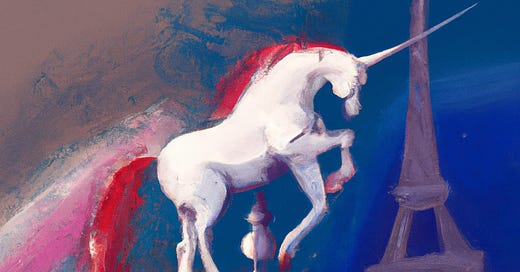Why the French Renaissance is about to conquer the world
A deep dive into how France is unlocking GenZ and building the next-gen cultural startup nation, co-written with Thomas Owadenko and Dominique Delport.
French startups are driving the news
In the past month, NBA rights were signed by two French unicorns in the entertainment business. On the one hand, Jellysmack, a startup that helps creators explode on major digital platforms, won the rights to exploit NBA content in order to increase the latter’s visibility in Europe and the Middle East over the next few years.

On the other hand, Sorare, an Ethereum-based play-to-earn fantasy football game valued at $4.3 billion, is now expanding with an upcoming free-to-play NFT fantasy basketball game. But the creator economy isn’t the only sector that has French startups buzzing.
Just last week, Parisian fashion brand Coperni took TikTok and the rest of the world by storm with their spray-fabric painted dress worn by iconic model Bella Hadid, while BeReal, on the crest of its popularity with its 14,7M app downloads in September alone, has become the coveted social app of the younger generations almost everywhere. And did you know that Ledger, another Paris-based company that develops hardware security products to protect cryptocurrency and blockchain application users, now secures more than 20 percent of the world’s crypto and digital assets in more than 5M wallets sold? Or that Voodoo has exceeded 6B downloads with their +100 hyper-casual games, which places it third globally for downloads behind Meta and Google since the App Store’s creation?
What do all these buzzing examples have in common? They are all savvy GenZ-centric startups, consumer startups, paving the way for tomorrow’s economy. Because it’s a fact that GenZers are the biggest generation, making up almost 30 percent of the world’s population and expected to make up 27 percent of the workforce by 2025. Homa Games, Powder, Playplay, Yubo, Feels, Maki, Chefclub, Dogami, Voggt, Kard… the list of high-potential GenZ-geared C2C startups just keeps growing, attesting to the fact that France’s Economy is happening right now, with multiple initiatives to get everyone on board for this journey. For instance, neobank Vybe recently launched the Gen Z Act: a pact that brings together all companies and influencers who want to improve their services for Generation Z. The initiative already has +40 companies and +30 influencers who represent more than 25M subscribers.
An all-time leader in the creative industry
If France is known for its attractiveness (the top tourist destination in the world, the top country in terms of Michelin 3-Star chefs,..) since two years, France is also the top country in Europe for direct foreign investments, an admitted effect of the “Macronomics”. And if France’s leadership in the luxury and fashion industry is growing with an impressive 28 % of world market share, it has always been related to big companies growth (KHOL as Kering-Hermes-l’Oreal-LVMH.) The situation looks similar in the entertainment and advertising sectors, with heavyweights like Ubisoft, Vivendi, Publicis, Havas or Banijay-Endemol-Shine, the largest production company in the world. For years France was known to be the second country after the US for registered startups at CES in Las Vegas, under the “French Tech” label, representing companies like Withings, Devialet, with massive public support. But what is at play here for GenZ is different.
Computing and network effects are breaking the silos between industries and mixing code and culture, content and data, inspiration and AI, and engaging global youth communities. There is, in fact, a strong common denominator between France and GenZ : Creativity. According to a 2021 Vice Insights study, “Creativity” is the soft skill 74 percent of GenZ want to master for their future career. Like Seth Godin rightly said: “People do not buy goods and services. They buy relationships, stories, and magic”. And this has never been more true than for GenZ, one of the most creative and entrepreneurial generations of all times. 46% percent of GenZ in France want to create their own company. Ten years ago, the majority of young French students wanted to become civil servants with guaranteed lifelong contracts. This is a radical change and not just within the most elite Grandes Ecoles (our Ivy League).
Even without a diploma or financial resources, you can enroll in one of the best coding school in the world, “Ecole 42”, which has already expanded into 20 countries with a disruptive concept: no curriculum needed, no tuition fees, no teachers but meritocracy, four years and 31 levels of hard work and peer to peer learning. And after they graduate, these GenZ students will dream of joining the iconic Parisian Station F, the largest incubator in the world, which hosts 1,000 startups under the roof of a gigantic 19th century train station (Halle Freyssinet), a building as long as the Eiffel Tower (300m) that attracts 50 percent of international entrepreneurs! Yes, ‘Emily is in Paris’, but she is not the only one. Paris looks more and more like the new Silicon Valley.
Code & Culture: the French Renaissance
Mind-blowing, right? France has always known how to link technology and culture, since the Lumiere Brothers (the first cinematograph), Georges Melies (first VFX) or Nicephore Niepce (inventor of photography). More recently, DailyMotion, Deezer and Viadeo were started before Youtube, Spotify, and LinkedIn! But at a time when startups needed access to capital to expand globally, and France was run by a very conservative banking system with a limited VC scene. This is no longer the case today, thanks to a variety of factors, such as the creation in 2012 of Bpifrance, France’s public investment bank, a unique model in the world with its continuum of solutions to support and finance entrepreneurs at all stages (Disclosure: Marie works there as a manager for the EuroQuity matchmaking platform.) Lets not forget the growing interest of international investors like Tiger, GE, Softbank, a16, Sequoia…that had a crush on France next-gen entrepreneurs and helped back 26 French unicorns (vs. 3 in 2017). Another notable fact, venture capital that was once considered a cottage industry has entered the mainstream with successful creators turning VC (Free, Smartbox, Blablacar, Criteo,..), while angel networks, crowdfunding platforms and new consumer-led investment vehicles are popping up like mushrooms.
But the real reason is that “French Renaissance” is in this country's DNA. As the UK has been built on finance and trade, Germany on engineering and manufacturing, France has always embodied the universal mix of cartesianism and culture. It is the uniqueness of Château de Versailles and its symetrics gardens & pools that are quintessentially French: aestheticism and geometry, as Louis XIV was surrounded by as many artists than scientists. This is also why the Eiffel Tower is one of the most visited and Instagrammed buildings in the world. Beyond the technical prowess of the engineer Gustave Eiffel and his team that built this steel monument and its 18,000 pieces in only two years, two months and five days in 1887, it is also an incredible piece of architecture and design that symbolizes Paris, the City of Lights, and France all over the world.
Brazilian journalist Caio Tulio Costa said "The Internet borders are not created by languages but by cultural links." France is now well-positioned to be one of the most attractive countries for GenZ by creating platforms and helping unique creators and entrepreneurs emerge. If Israel is the startup nation, France is definitely becoming the cultural startup nation for GenZ. So, watch out and bon voyage!
—
Marie Dollé, Dominique Delport, Thomas Owadenko.








Well written and makes for a positive feeling. A small correction: It seems the "Eiffel rejected designs" is not true: https://defacto-observatoire.fr/Medias/Factuel/Fact-checks/Cette-image-ne-montre-pas-differents-designs-rejetes-de-la-Tour-Eiffel/